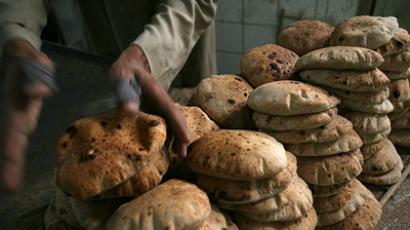US paradox: Wasting food while going hungry
America's expanding waistline proves the country's love affair with food. But almost as much as is consumed is being dumped in the trash every day. And that is despite the fact that millions in the US are now struggling to put food on the table.
RT has met the so called “dumpster divers” who say a few minutes of raking through garbage bags can deliver a banquet.And all this food is being wasted at a time when US news reports are full of stories of extreme hardship.CNN: “The number of people living on food stamps has reached an all-time high.”FOX: “More and more people are going hungry.”MSNBC: “One in three Americans lives in or near poverty.”ABC: “…and suffering hunger in this land of plenty.”In this land of plenty, roughly 2.7 million tons of food are reportedly raised and grown each year. The same country that has such a love of consuming calories also loves to waste them.Gio Andollo is a dumpster diver. Instead of paying for food, he rummages through garbage bags on the streets of New York City, where tons of edible food are thrown out each night.The 27-year-old musician makes his way from the bakery to the deli, relying on supermarket trash for his essential vitamins.“There’s hot food here…which probably comes from a hot food bar,” he comments while going through the bags. “Even without opening the bag, I can see an orange, apple, parsnip, some greens.”What we and others crowding around Gio see, is that in a country where more than 40 million people struggle daily to get enough to eat, millions of meals are literally being thrown away.“This food, as you can see, is perfectly edible,” Gio explains. “There’s no sense it should be wasted and thrown away. Otherwise it would end up on top of a landfill somewhere.”An estimated 30 to 50 per cent of US food produced for consumption ends up in landfills each year. This comes at an annual cost of more than US $1 billion. Simultaneously, food prices continue to rise, leaving millions more in line at soup kitchens, and ultimately searching though trash.The documentary “Dive” follows filmmaker Jeremy Seifert and his friends in the back alleys and rubbish piles of Los Angeles, as thousands of dollars’ worth of edible food is salvaged.“It’s a result of our excess. We are a wealthy country and we have excess and so waste is really, necessarily, a by-product of excess, and it’s a bad habit of the sort of spoiled rich kid, as it were,” he told RT.A paradoxal society – as America’s has turned out to be – is defined by wasteful consumption and an ongoing struggle to make ends meet. A paradox highlighted by Gio Andollo’s view of food as a non-essential, luxury item.“If I need to cut my expenses, the first thing that will go is food,” Andollo declares.Amid America’s expanding climate of food waste, critics say the country’s overall carelessness is causing a ripple effect around the world.“It is a global market now, and our overconsumption directly impacts the hungry and the poor in other countries,” Jeremy Seifert continued. “Us taking more than we need affects the prices of food, affects the availability of food. Why did I make the film? It was a sense of outrage at the injustice of food waste.”














